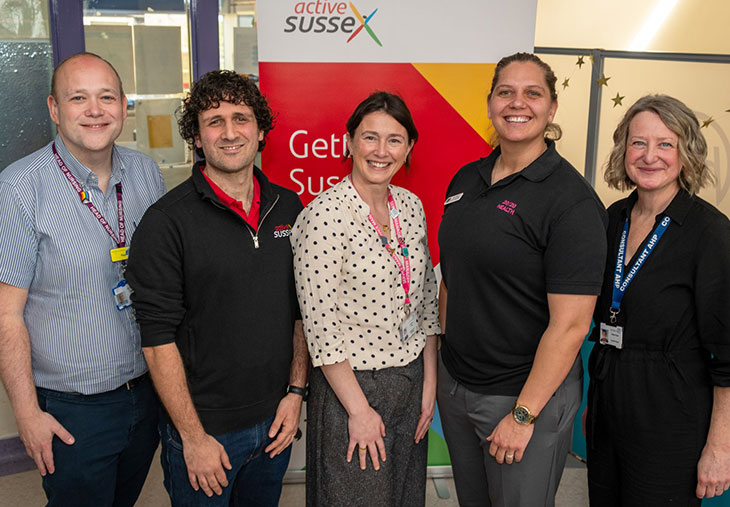An innovative pilot programme in the Irvine Unit at Bexhill Hospital is revolutionising the way stroke rehabilitation is approached, offering new hope to patients and healthcare providers alike.

Funded by Active Sussex, in partnership with the trust, Active Rother, East Sussex Public Health, and 20/20 Health, this landmark project aimed to address the detrimental effects of inactivity among stroke patients. The first phase of this transformative project was celebrated on 7 March, marking an important milestone in its journey.
The pilot provided 26 weeks of supervised physical activity sessions led by health instructors from 20/20 Health, alongside trust physiotherapists. As well as the activity at the Irvine Unit, the initiative also supported patients in transitioning to community-based exercise programmes to ensure long-term, active lifestyles.
Patients benefited from four sessions a week in the hospital, as well as community-based provision in Hastings, Bexhill, Lewes and Eastbourne.
Karen Poole, AHP Rehabilitation Consultant for the trust and Strategic Clinical Lead for Rehabilitation and Reablement at NHS Sussex, said: “This exciting collaboration between the NHS and a local community health instructor provider has had a significant number of positive impacts.
“The activity groups increased access to physical and social activity for patients recovering at the Irvine Rehabilitation Unit, contributing to their mood, wellbeing and a positive culture across our workforce.
“This pilot has also tested how we can work with non-NHS partners in traditional NHS environments, paving the way for greater confidence in this approach. The Active Sussex Reconditioning Pilot serves as an exemplar of what we can achieve when we work together.”
Early data analysis shows patients experienced a 50% improvement in balance, a 34% increase in sit-to-stand ability, and a 22% reduction in rehabilitation complexity – offering them greater independence and a brighter recovery journey. The pilot ran across six months and included 54 exercise sessions, giving patients an average of nine extra hours of exercise during their stay.
For patients, this programme has been more than just exercise. It has been a source of joy, social connection and a renewed sense of purpose.
One participant shared: “After attending the group for the first time I felt fantastic. I’ve been able to walk further and longer since coming to the groups and I would love to attend some of their other sessions once I get home.”
Another said: “During my stay in hospital, my mood fluctuated day-to-day, with no real direction or purpose. I found myself sitting aimlessly for hours.
“Once I attended one Active Sussex session my whole mood shifted. I was given a routine which I desperately needed, as well as a group of supportive peers.”
Chris Stern, a physiotherapist at the Bexhill Irvine Unit, said: “It was amazing to see the increased physical activity of the patients throughout the week alongside their therapy.
“I often heard them chatting among themselves between sessions, encouraging others to join, and making friends throughout their stay.
“Through the combination of the groups and their ongoing therapy, I saw how their mobility and confidence improved from starting the group to when they left to go home and continue their rehab journey at home.”
Claire Wild, Team Lead Occupational Therapist, observed: “A lot of my patients have done the sessions and it has definitely helped their confidence, their motivation, and their relationship with other patients on the ward.”
Ross Joannides, Strategic Relationship Manager at Active Sussex, hailed the success of this collaborative approach: “It has been a fantastic process to be able to formulate and co-design an intervention collaboratively with the NHS and local authority to better meet the priorities of all partners involved and most importantly support greater health outcomes for those recovering from stroke in East Sussex.
“The project has shown how voluntary and community-based partners can work with statutory organisations to overcome governance challenges to deliver a service that has had a significant impact on patients’ health outcomes.”
The project has also provided unique insights into barriers faced by patients after discharge, such as transport and financial constraints.
Jas Gray from 20/20 Health explained: “Something we learned from doing these sessions in the hospital is that there are different barriers that we did not expect.
“One of these is getting patients at home into the community classes. This is something that was unexpected, but something we are going to try to reduce by offering exercise classes at multiple places in the community, giving them the opportunity to access physical activity classes nearer to their home.”
The trust are now working with Active Sussex on plans to extend the scheme and, with additional funding, live-stream these impactful exercise sessions from the Irvine Unit to other trust hospitals and potentially wider.
With funding and support, this initiative promises to reshape the future of stroke rehabilitation and inspire a culture of movement and activity within hospitals and beyond.
You can watch a video of the impact of the project here:
